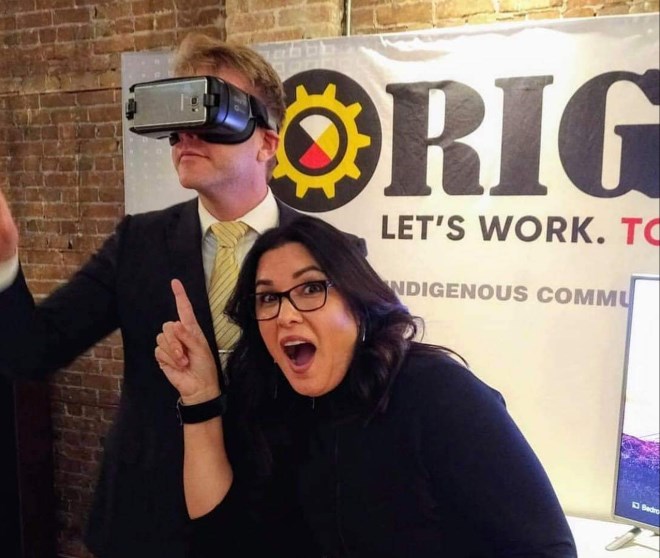A northwestern Ontario recruiting firm is entering the virtual reality realm to help steer more Indigenous people into the industrial workforce.
“We’re taking the old-school workplace tours and bringing it to the individual,” said Paul Giles, co-owner of Origin Recruitment, a Fort William First Nation and Thunder Bay-based Indigenous-owned consultancy.
Since starting Origin in 2010, it’s been the mission of Giles and his wife, Melissa Hardy-Giles, to increase First Nation participation in the workforce by matching people’s innate skills with industry needs.
With their job-readiness programs and mobile heavy equipment simulators, the nine-employee company’s calling card has been about trying to reduce the guesswork in the trainee selection process.
In taking a technical and scientific approach to pre-employment screening and evaluation, they assess an individual’s aptitude, suitability, and confidence by sorting out and slotting them into potentially rewarding careers that best fit their natural abilities.
From there, they can direct job seekers into direct employment opportunities, apprenticeship programs, or other levels of training.
“We’re trying to revolutionize the relationship between the communities, the employment and training providers, and employers,” said Giles.
Since acquiring the equipment simulators in 2014, they’ve trailered them into 59 First Nation communities across Northern Ontario and Western Quebec, assessing the talents of thousands of job seekers.
In the last two years, Giles said they’ve placed 104 individuals into equipment operator jobs in the construction and mining industry.
“We’ve had outstanding results, not only in being able to connect people with the right careers but to get good results in terms of placing people into employment.”
The new virtual reality platform, Giles said, was developed in tandem with an undisclosed Toronto high-tech firm, and faculty at the University of Toronto, and the University of Waterloo.
Together, they’re building a diverse library of work-site experiences, allowing job seekers donned with a headset to view an introductory day-in-the-life of such skilled occupations as an underground miner, pole-line crew or other construction-based fields where there is high demand for people.
“We’re forming a team that will include an industry partner,” said Giles.
Their first-stage video platform provides an immersive 360-degree experience, but Giles said its shortcomings are that there’s no computer animation and limited interaction within a given environment.
The next iteration should be rolled out in the next few months where participants will be able to perform assigned tasks that allow evaluators like Giles to determine an individual’s ability to follow procedures and their overall cognitive awareness to perform work safely.
Origin’s existing equipment simulators provide evaluators with data readouts and some insight if an individual is capable of performing a particular job.
From there, they can direct them into job opportunities, apprenticeship programs or other training.
“That’s something we’re trying to replicate in the virtual reality modules. We’re not there yet,” said Giles.
Having these performance-based assessment tools at hand, he explained, helps Indigenous people overcome the traditional barriers that prevented them from entering the industry.
Literary-based assessments like timed written tests to determine aptitude or an interview-focused process can be culturally intimidating and doesn’t allow First Nation people to demonstrate their natural abilities.
“These are things we’re trying to combat to build these (assessment) tools in a way that is unique, said Giles.
Creating a realistic as possible work environment through simulation or virtual reality goes a long way toward better employee retention, he added.
At times, Giles said their pre-screening and assessment process has met with resistance from communities and training providers, but their strategy and efforts are about creating a quality training pool that leads to better employment outcomes.
“You have people who know actually why they’re there and they have the motivated purpose to be there, and you’re getting employers that don’t question the quality of the training.
“It’s worth having an unbiased opinion, As a company that provides people directly to industry we understand the expectations and we can help match the people with those expectations.”
Based on the success they enjoyed in Ontario and Quebec, Giles said they’re preparing to take their model nationwide through the creation of a National Advisory Council.
They’ve enlisted former Regional Chief of Ontario Isadore Day, Canadian Council for Aboriginal Business director Paul-Emile McNabb and Resolute Forest Products’ Indigenous Affairs director Georjann Morriseau, among others, to make political and industry connections of them across the country.




